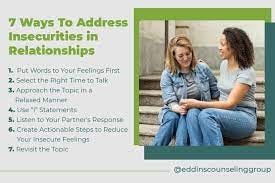5 Toxic Dating Trends That Might Be Keeping You Single — And How to Break Free


Unmasking Insecurity: 10 Signs Your Relationship Might Need a Closer Look
Insecurity can be a silent thief in a relationship, slowly eroding trust, intimacy, and happiness. Recognizing its subtle signs is crucial for maintaining healthy and fulfilling partnerships. Here are 10 common signs of insecurity that might indicate your relationship needs a closer look:

1. Constant Need for Reassurance: Do you find yourself constantly seeking reassurance of your partner’s love and affection? While needing validation is normal, an insatiable need for it can point to underlying insecurities. This can manifest as excessive questioning, seeking compliments, and feeling threatened by any perceived lack of attention.
2. Jealousy and Possessiveness: Do you feel jealous of your partner’s interactions with others, even friends or colleagues? Possessiveness and jealousy can stem from a fear of losing your partner, often fueled by insecurities about yourself or your relationship. This can lead to controlling behavior and emotional outbursts.
3. Difficulty with Trust: Do you struggle to trust your partner, even when they give you no reason to doubt them? This lack of trust can lead to constant suspicion, monitoring their activities, and questioning their motives. It can create a suffocating environment and impede intimacy.
4. Difficulty with Open Communication: Do you find it difficult to express your needs and feelings openly with your partner? Fear of rejection or disapproval can lead to suppressed emotions and resentment. Insecure individuals might struggle to communicate effectively, leading to misunderstandings and conflict.
5. Taking Things Personally: Do you tend to take even harmless comments or actions personally, interpreting them as a personal attack or criticism? This can be a sign of low self-esteem and a need for validation. It can lead to unnecessary conflict and emotional turmoil.
6. Need for Constant Approval: Do you base your self-worth on your partner’s approval? Do you need constant validation and compliments to feel good about yourself? This can lead to dependence on your partner and a fear of displeasing them.
7. Fear of Abandonment: Do you have an intense fear of being left alone or abandoned by your partner? This can stem from past experiences or childhood attachment issues. It can manifest as clinginess, neediness, and difficulty creating healthy boundaries.
8. Blaming and Defensiveness: Do you tend to blame your partner for your problems or insecurities? Do you get defensive when they try to point out your flaws? This inability to take responsibility and acknowledge your contribution to issues can impede growth and resolution.
9. Difficulty with Independence: Do you struggle to spend time alone or pursue your own interests outside of the relationship? This can be a sign of codependency and an unhealthy reliance on your partner for your happiness and fulfillment.
10. Difficulty with Accepting Change: Do you find it difficult to accept any changes in your relationship, even positive ones? This can be a sign of fear of the unknown and a need for control. It can stifle growth and hinder the evolution of the relationship.
Insecurity is a complex issue, and these signs may not always indicate a problem in your relationship. However, recognizing them can be the first step toward understanding and addressing underlying issues. Open and honest communication, seeking professional help if necessary, and building healthy self-esteem are crucial in overcoming insecurity and creating a thriving relationship.

Remember, insecurity doesn’t have to be a defining feature of your relationship. By recognizing its signs, taking responsibility, and working through your issues together, you can build a strong, trusting, and fulfilling partnership.
Comments
Post a Comment